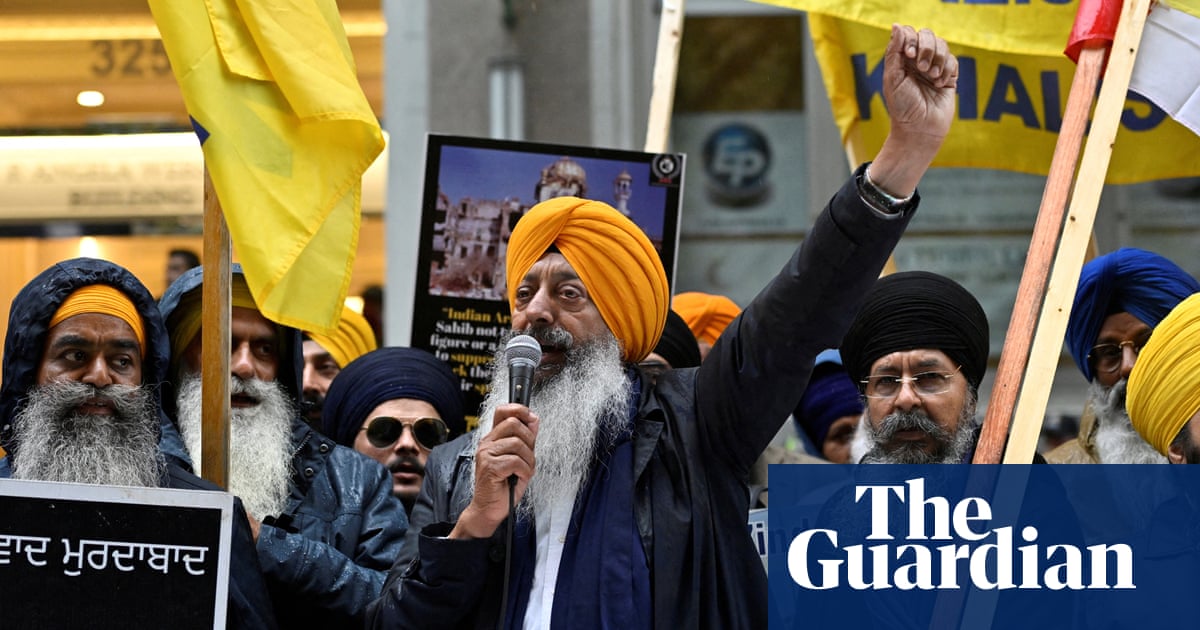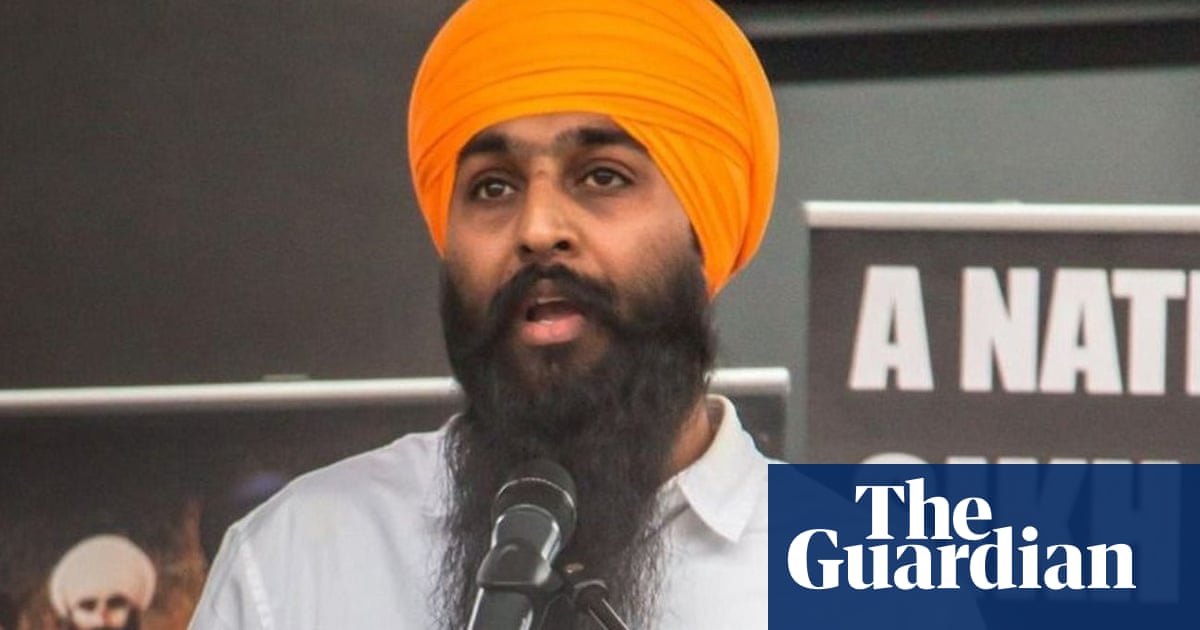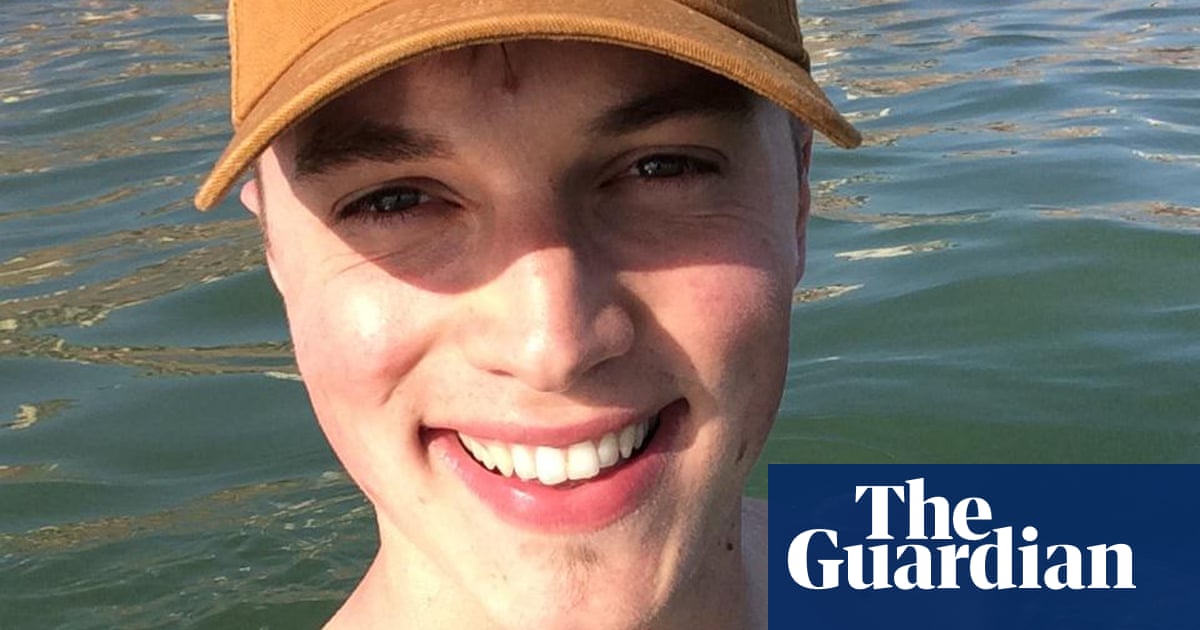
The family of Avtar Singh Khanda, the 35-year-old Sikh activist who died in a Birmingham hospital after a short illness this summer, is seeking a formal inquest into his death from the chief coroner for England and Wales.
The request by the family, in conjunction with the Sikh Federation UK, comes on the heels of a claim by Canadian prime minister, Justin Trudeau, that India was linked to the murder of another Sikh activist, Hardeep Singh Nijjar, in British Columbia.
Nijjar and Khanda were members of the separatist Khalistan movement, which is outlawed in India.
Khanda died on 15 June after he suddenly fell ill and was admitted to a hospital in Birmingham. The official cause of death, which was declared post-mortem, was acute myeloid leukaemia, a blood cancer. Nijjar, who was 45, was killed three days later, on 18 June, in a hail of gunfire outside his place of worship. Friends said he was warned multiple times by the Canadian Security Intelligence Service that his life was in danger.
The FBI privately issued warnings to several Sikh activists in the US after the murder in Canada under “duty to warn” laws. The Sikh Federation UK has said it is concerned that British authorities have not given security advice to high-profile individuals or to gurdwaras, the Sikh places of worship.
The call for an inquest, which is being announced at a press conference in London on Monday, is being led by the barrister Michael Polak, who is calling for the chief coroner for England and Wales to direct an inquest into Khanda’s death and whether the activist’s right to life was properly protected given the public threats against him in India.
Sikhs are also planning to gather at the Indian high commission in central London to protest against Nijjar’s murder and to call on the British government to “come clean” on Indian-government targeting of activists in the UK.
In an interview with the Guardian, Polak – who focuses on human rights cases – said Khanda had been declared “enemy No 1” in press reports after being investigated in April by Indian intelligence services in connection to a violent March protest in front of the Indian mission in London, during which an Indian flag was pulled down and some security guards were reportedly injured.
Shamsher Singh, a close friend of Khanda, said media reports in India that portrayed Khanda as having orchestrated the protest were categorically false, as were reports that he had been arrested or charged in the UK.
Polak has alleged that British police should have understood that Khanda was potentially in danger.
There are also unanswered questions about the days leading up to Khanda’s death. His supporters and family have said they have not received medical records they have sought, nor evidence that backed the leukaemia diagnosis. His mother, who was not able to attend the funeral after allegedly being denied a visa by the Home Office, has said she believed he was poisoned.
In a statement, West Midlands police said they had undertaken a “thorough review” of Khanda’s death and that they had concluded there were “no suspicious circumstances”.
But Shamsher Singh disputed that characterisation, saying there had been no indication of what kind of review the police executed, nor the nature of the investigation.
Polak said he could not definitively state that India was behind Khanda’s death, but that the circumstances clearly merited an investigation.
“If it was happening in a vacuum and we believed India was a law-abiding country, we would say that it is unlucky. But there were threats against him and he was named as enemy No 1 [in the media]. At the very least it is suspicious,” he said.
India has denied any role in Nijjar’s killing in Canada. The Indian embassy in Washington did not respond to a request for comment on Khanda’s death.
US secretary of state, Antony Blinken, said he was “deeply concerned” about Trudeau’s allegations called on India to cooperate with Ottawa’s investigation.
The government of Narendra Modi, the Indian prime minister, has been heavily criticised for supporting authoritarian tactics by human rights advocates. A report by Human Rights Watch recently concluded that authorities had “intensified efforts” to silence activists and journalists by using politically motivated criminal charges to jail individuals who criticised the government or exposed government abuses.
Dabinderjit Singh, the principal adviser of the Sikh Federation UK, said Khanda’s death needed to be “fully investigated” and called for any information on the case that may have been collected by the Five Eyes intelligence alliance members – the US, Canada, UK, Australia and New Zealand – to be released.
There were new signs of tensions on Friday, when India’s high commissioner to the UK, Vikram Doraiswami, attempted to visit a gurdwara in Glasgow, despite a longstanding Sikh community ban on Indian government officials visiting their religious sites in the UK.
Indian officials said three protesters disrupted the planned visit and that Doraiswami was allegedly turned away after “one attempted to violently open” his car door. The Sikh Federation, the UK branch’s umbrella group, said the visit was organised without the full congregation’s knowledge, and that “the only confrontation” was from an individual who “made a false report of being assaulted”.
A spokesperson for Police Scotland told Reuters that officers were called to a report of a disturbance near the gurdwara, but said there were no injuries. Enquiries were ongoing and no arrests had been made, police added.












